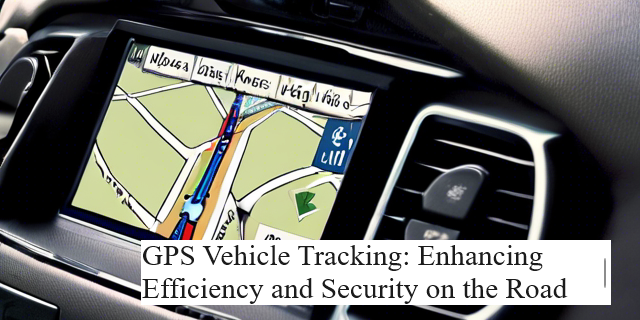Navigated Table of Contents
GPS Vehicle Tracking: Enhancing Efficiency and Security on the Road
In today’s fast-paced world, GPS vehicle tracking has become an essential tool for individuals and businesses alike. Whether you want to monitor your personal vehicle, track your fleet, or ensure the safety of your loved ones, GPS tracking offers a range of benefits.
In this blog post, we will explore the advantages of GPS vehicle tracking, the different types of trackers available, and how they can improve efficiency and security on the road.
The Benefits of GPS Vehicle Tracking:
Real-Time Location Tracking: GPS vehicle tracking allows you to monitor the real-time location of your vehicles. This feature is particularly useful for businesses with fleets, as it enables efficient route planning, dispatching, and monitoring of driver activities.
Improved Fleet Management: With GPS tracking, fleet managers can gain valuable insights into their operations. They can track vehicle usage, monitor fuel consumption, and optimize maintenance schedules. This leads to improved efficiency, reduced costs, and better customer service [3].
Enhanced Security and Theft Prevention: GPS trackers provide an added layer of security by enabling vehicle recovery in case of theft. With real-time tracking, you can quickly locate and recover stolen vehicles, minimizing losses and increasing the chances of apprehending the culprits [2].
Types of GPS Vehicle Trackers:
- Portable Trackers: These compact and versatile trackers can be easily moved between vehicles. They are ideal for personal use, allowing you to track your car, motorcycle, or other valuable assets.
- Hardwired Trackers: Hardwired trackers are permanently installed in vehicles and are commonly used for fleet management. They offer more advanced features such as engine diagnostics, driver behavior monitoring, and geofencing.
- OBD Port Trackers: These trackers plug into the OBD-II port of a vehicle, providing easy installation and access to vehicle data. They are popular among individuals and small businesses looking for a cost-effective tracking solution [1].
Choosing the Right GPS Tracker:
- Consider Your Tracking Needs: Determine the specific features and functionalities you require. Assess factors such as real-time tracking, geofencing, driver behavior monitoring, and compatibility with your vehicle type [3].
- Evaluate Features and Functionality: Compare different GPS trackers based on their features, such as battery life, accuracy, reporting capabilities, and user-friendly interfaces. Look for trackers that offer customizable alerts and reports to suit your specific needs [1].
- User-Friendly Tracking Platform: Ensure that the GPS tracker you choose has an intuitive and easy-to-use tracking platform. A user-friendly interface will make it easier to monitor and manage your vehicles effectively.
How GPS Vehicle Tracking Enhances Efficiency:
- Optimized Routing and Dispatching: Real-time tracking allows fleet managers to optimize routes, reduce idle time, and improve overall efficiency. By identifying the most efficient routes, businesses can save time, fuel, and money.
- Improved Fuel Management: GPS tracking provides insights into fuel consumption patterns, enabling businesses to identify inefficient driving behaviors, such as excessive idling or speeding. By addressing these issues, companies can reduce fuel costs and promote eco-friendly driving practices.
- Maintenance and Vehicle Health Monitoring: GPS trackers can monitor vehicle diagnostics, including engine performance, battery health, and maintenance schedules. By staying on top of maintenance needs, businesses can prevent breakdowns, extend vehicle lifespan, and reduce repair costs [2].
Ensuring Security with GPS Vehicle Tracking:
- Theft Prevention and Recovery: GPS trackers offer an added layer of security by enabling real-time tracking and recovery of stolen vehicles. In case of theft, you can quickly locate the vehicle’s exact location, increasing the chances of recovery and minimizing losses [3].
- Driver Behavior Monitoring: GPS tracking allows businesses to monitor driver behavior, including speeding, harsh braking, and unauthorized vehicle use. By promoting safe driving practices, companies can reduce accidents, lower insurance costs, and protect their reputation.
- Emergency Assistance and Response: In the event of an emergency, GPS tracking can provide crucial information about the vehicle’s location, enabling faster response times. This is particularly important for businesses operating in remote areas or high-risk industries [2].
Latest advancements and trends in GPS vehicle tracking

GPS vehicle tracking technology has seen significant advancements in recent years, revolutionizing various industries such as transportation, logistics, healthcare, and personal use.
These advancements have brought about new trends and possibilities in GPS tracking technology. Let’s explore some of the latest advancements and trends in GPS vehicle tracking:
Real-Time Tracking: Real-time tracking is a significant trend in GPS technology. It allows for accurate and up-to-date tracking of assets or people, providing improved security, increased efficiency, and better customer service. For example, logistics companies can track their deliveries in real-time to ensure timely delivery [2].
Artificial Intelligence Integration: Artificial intelligence (AI) is being integrated into GPS tracking technology to enhance accuracy and provide more detailed information about the location of assets or people [2].
AI is also used to analyze data from GPS tracking devices, identifying patterns and trends to improve operations and reduce costs. For instance, AI can optimize delivery routes, reduce fuel consumption, and improve asset utilization [2].
Mobile Applications: Mobile applications are becoming increasingly popular in GPS tracking technology [2].
They allow users to track assets or people using their mobile devices from anywhere. Mobile applications offer ease of use, real-time updates, and improved visibility. Parents can use mobile applications to track their children’s location for safety purposes.
Geofencing: Geofencing is a new trend in GPS tracking technology that allows the creation of virtual boundaries around specific locations [2].
When an asset or person enters or leaves the boundary, a notification is received. Geofencing improves security, asset utilization, and reduces costs. Logistics companies can use geofencing to prevent asset loss or theft.
Predictive Analytics: Predictive analytics is another growing trend in GPS tracking technology. It utilizes historical data to predict future trends, optimizing routes, reducing fuel consumption, and improving asset utilization.
Logistics companies can predict delivery times and optimize routes to reduce fuel consumption using predictive analytics.
Cloud Computing: Cloud computing is increasingly popular in GPS tracking technology. It allows data storage in the cloud, making it accessible from anywhere.
Cloud computing offers improved scalability, reduced costs, and better security. Logistics companies can store their data in the cloud for easy accessibility [2].
Internet of Things (IoT): The Internet of Things is a new trend in GPS tracking technology that enables devices to connect and communicate with each other.
IoT is used to improve operations, reduce costs, and enhance customer service. For example, logistics companies can use IoT to track their assets and ensure timely delivery.
Integration with Other Technologies: GPS tracking technology is increasingly being integrated with other technologies to provide greater benefits.
For instance, GPS tracking solutions now incorporate machine learning algorithms for more accurate tracking and predictive maintenance for vehicles and equipment. Integration with video surveillance and dash cameras provides a complete picture of a vehicle’s movements and activities.
While GPS vehicle tracking technology offers numerous benefits, there are also concerns about privacy and data usage. Careful consideration and implementation are necessary to address these concerns and ensure the responsible use of GPS tracking technology.
Conclusion:
GPS vehicle tracking has revolutionized the way we manage and monitor vehicles. With real-time location tracking, improved fleet management, and enhanced security features, GPS trackers offer numerous benefits for individuals and businesses.
By choosing the right tracker and utilizing its features effectively, you can optimize routing, reduce fuel consumption, and ensure the safety of your vehicles and drivers. Embrace the power of GPS vehicle tracking and experience increased efficiency and peace of mind on the road.




